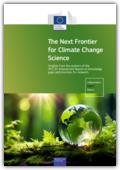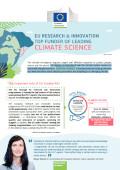Why adapting to climate change matters
Adaptation to climate change is about adjusting to a warmer world, to protect people, nature, our prosperity and way of life.
Climate change is one of the biggest threats facing humanity. The Earth has already warmed by over 1.1°C since the late 19th century with far-reaching impacts on every region of the world, causing more frequent and intense extreme events such as heatwaves or droughts, changing rainfall patterns, melting ice, and altering both natural and human habitats. Some consequences of climate, such as sea-level rise, will continue to unravel for centuries to millennia.
Adaptation feasibility and effectiveness depends on the level of warming and communities' readiness. Every bit of warming matters, making immediate and deep cuts in the emissions of greenhouse gases the best adaptation strategy.
However, in parallel, we also must prepare for the unavoidable climate impacts which are already occurring and are likely to continue for decades.
Adaptation will be necessary in agriculture, biodiversity, coastal areas, energy, finance, forestry, health, infrastructure, marine and fisheries, transport, urban, water management and many others. Without action today, adaptation will be costlier and more difficult for the next generations.
The role of EU research and innovation
EU-funded projects are developing essential knowledge, data and tools that underpin effective adaptation strategies in Europe and globally.
Issues tackled range from improved understanding of climate impacts at global-to-local scales, including their compound and cascading effects on the economy and society and the exploration of adaptation levers and enablers.
This endeavour is generating customised adaptation measures that build resilience through tailor-made climate services, nature-based solutions, and other innovations.
Scientists are leveraging state of art climate information and analytics, Earth observation techniques as well as cutting edge digital tools such as artificial intelligence and machine learning to deliver genuine breakthroughs in adaptation science and bring our adaptive capacities to the next level.
The results of these projects are invaluable for paving the way towards making Europe climate-resilient by 2050 as envisioned by the European Climate Law.
EU projects
Projects currently supported by Horizon Europe under Destination 1 “Climate sciences and responses for the transformation towards climate neutrality” of Cluster 5 (Climate, Energy and Mobility)
2021 call
2022 call
2023 call
For examples of older projects funded under earlier work programmes please refer to the brochure Science for climate action: EU research contribution to IPCC Working Group II on Impacts, Adaptation and Vulnerability
Background
The European Climate Law underlines the importance of stepping up adaptation efforts, including through more decisive action on climate proofing, resilience building, disaster risk prevention and preparedness.
In 2021, the Commission published its new, more ambitious EU Strategy on Adaptation to Climate Change that sets out its vision on how Europe can become ready to face climate disruptions by 2050. The strategy is based on 4 key principles: smarter, faster, and more systemic adaptation, together with an enhanced international action on adaptation.
To deliver on the Adaptation Strategy, the EU has also launched in 2021 the EU mission on adaptation to climate change, which has since become its key implementing vector. The goal of the mission is to support at least 150 regions and local authorities to become climate resilient by 2030. It will achieve this by testing and up-scaling innovative solutions, creating the right conditions for transforming our societies, and providing demonstrations of deep climate-resilience.
In 2024 the European Climate Risk Assessment (EUCRA) report from the EEA extended the knowledge base on climate impacts and risks for Europe, complementing the reports by the Intergovernmental Panel on Climate Change, the Copernicus Climate Change Service, and the Joint Research Centre of the European Commission, as well as the outcomes of EU-funded research and development projects and national climate risk assessments.
Documents

Insights from the authors of the IPCC 6th assessment report on knowledge gaps and priorities for research.

By helping us understand how the climate system works and how it will change over time, climate science is fundamental for making informed and wise decisions about reducing emissions and adapting to a changing climate.
